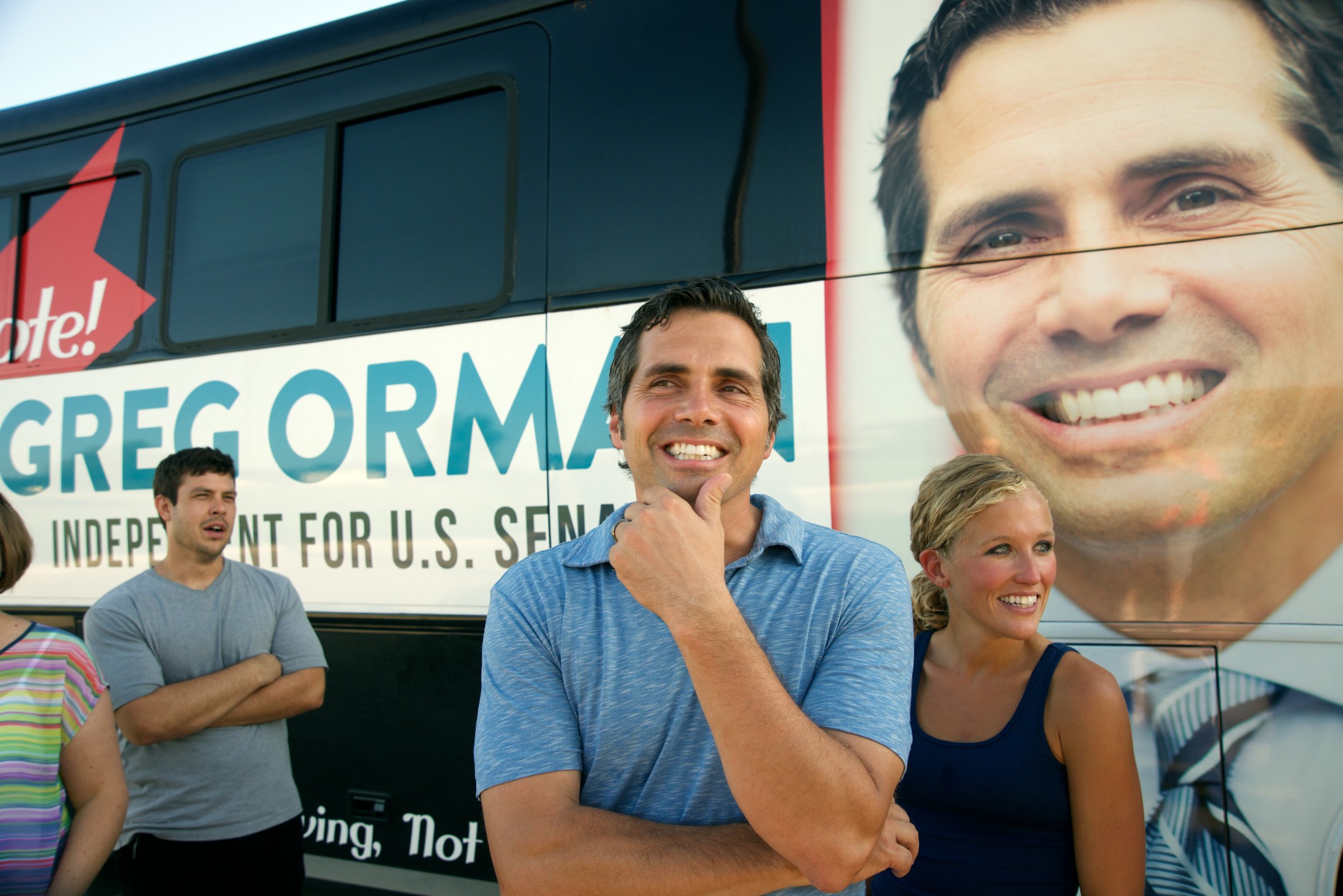
Updated 4:20 p.m. E.T. on Sept. 4
The battle for the Senate could come down to Kansas, where a surprise contest in one of the country’s most conservative states has the potential to stymie the Republican bid to retake control of the chamber.
That unlikely outcome became a distinct possibility on Wednesday night, when Democratic candidate Chad Taylor withdrew from the race, paving the way for an independent challenger to take on GOP Sen. Pat Roberts. In a recent poll conducted before Taylor’s exit, Greg Orman, the independent, ran 10 points ahead of the embattled incumbent in a hypothetical head-to-head matchup. The race also features a long-shot libertarian candidate, who could muddle the math even further.
Just a month ago, Kansas wasn’t on the radar for observers surveying the Senate map. Its voters haven’t sent a Democrat to the Senate since the Great Depression. Suddenly, a deep-red state in the Koch brothers’ backyard is shaping up as a potential political firewall for Democrats as they fight to stave off a GOP takeover.
So what’s the matter with Kansas?
Part of the problem is Roberts, 78, a three-term senator whose appeal to Kansans has worn thin. Normally a mainstream Republican, he has tacked to the right to head off a primary challenge, even voting against the farm bill in an agricultural stronghold. During a bruising campaign against Tea Partyer Milton Wolf, the New York Times reported that Roberts doesn’t maintain a home of his own in the state. He emerged from the primary battered, with a 27% approval rating that is six points lower than even Barack Obama’s in the state.
These weaknesses created an opportunity for Orman, a wealthy businessman running as a moderate reformer. Orman, who has never held elected office, has donated to both Democrats and Republicans. He advocates tax reform and reducing the regulatory burden on business owners. He talks about beefing up border security, but also supports immigration reform and a path to citizenship. He is a gun owner who wants to expand background checks to cover private sales. He supports abortion rights, but has spent much of his campaign extolling a brand of fiscal conservatism that plays well on the right.
His unexpectedly strong campaign has also benefited from broad disillusionment with the state’s political status quo. Republican Gov. Sam Brownback took office in 2011 and launched what he once dubbed a “real, live experiment” in Tea Party governance. He cut taxes, pruned the welfare rolls, slashed spending and forced the legislature into lockstep with his vision. But the state’s finances are a mess, the economy has sputtered and the moves have sparked a surprising backlash. (A RealClearPolitics average of recent polls shows Brownback trailing his Democratic counterpart, state House Minority Leader Paul Davis, by a few points.)
The lurch to the right has frustrated some conservatives, but Roberts was still running ahead of Taylor and Orman in a multi-way contest. Taylor’s surprise exit—which some Republicans believe was orchestrated by Democrats—frees up space for Orman to campaign as a fiscally conservative centrist. The independent possesses some crossover appeal, with the potential to stitch together both left-leaning voters and center-right Republicans who are fed up with the Tea Party. Orman has collected endorsements from more than 70 former Republican lawmakers in the state.
As for Roberts, he has been slow to recover his position after emerging from the primary. “Roberts has not been actively campaigning for about a month now,” wrote the Rothenberg Political Report‘s Nathan Gonzales. “The lack of a strong campaign infrastructure is one of the fundamental reasons why Roberts is in severe danger. He can’t count on the the traditionally red hue of Kansas in federal races to bail him out.”
Roberts got an unexpected boost Thursday when Kansas Secretary of State Kris Kobach announced that Taylor’s name would stay on the ballot because his withdrawal letter lacked a mandatory declaration that he was incapable of serving if elected. “The law is the law,” said Kobach, a Republican. In a tight race, the decision could siphon decisive votes from Orman.
Plus, the state’s hue certainly helps the Republican. Kansas remains as crimson as they come: Obama lost there by 22 points. Roberts has a massive fundraising advantage—his $1.4 million on hand dwarfs Orman’s $362,000—and his party is swinging into action to save his seat, dispatching top national strategists from Washington to oversee the stretch drive. But the race has emerged as a major September surprise.
If the GOP’s bid to retake the Senate withers and dies on the prairie, it would be one of the cruelest ironies imaginable.
More Must-Reads from TIME
- Donald Trump Is TIME's 2024 Person of the Year
- Why We Chose Trump as Person of the Year
- Is Intermittent Fasting Good or Bad for You?
- The 100 Must-Read Books of 2024
- The 20 Best Christmas TV Episodes
- Column: If Optimism Feels Ridiculous Now, Try Hope
- The Future of Climate Action Is Trade Policy
- Merle Bombardieri Is Helping People Make the Baby Decision
Write to Alex Altman at alex_altman@timemagazine.com